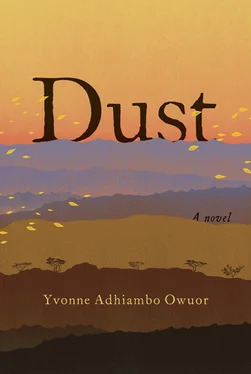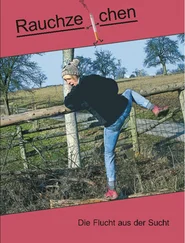She watches him.
He pulls out a five-hundred-shilling note. It falls across the thousand. She gives him a slow smile. Direct gaze. She picks up the money, rolls it, and sticks it behind her ear. Leaves the black ball on the table. Isaiah takes his cue and plays it. It crashes down the table, and bounces off a pocket into the opposite end, and bounces across the table, then into the middle pocket. It clatters inside. The woman leans over the table and stares at Isaiah.
She indicates the bar door with her head.
Isaiah downs his Tusker.
Waves at the others and swaggers out after her.
“Poor bugger,” mutters the explorer-blogger.
The D.O. focuses his hatred on the photograph of the Harambee Stars’ coach: a scummy, overpaid charlatan with a foreign accent.
The next day, a generation of marabou storks have taken position on available trees in the landscape. Babu Chaudhari watches Isaiah stumble into view. Disheveled hair, bloody face scratched, a haggard, glazed look. He appears smaller than he was yesterday.
Isaiah pulls out four hundred shillings.
“Nine hunred,” lisps Babu.
“What? You said three hundred and …”
“Nine hunred or folice. Nine hunred for two.”
Isaiah peels nine hundred shillings from his shrinking wad. “You’re a thief.”
Babu takes and holds each of the notes to the light. The threat of receiving fake money was a constant. “And you, fir, are a frostitute.” Babu grins.
Heat rises and sears Isaiah’s gullet, burns through and out his nostrils. Roar in his throat, and the need to reach over and squeeze the gums out of the bloody dolt. He grunts instead.
Babu Chaudhari titters, rheumy eyes damp.
A desire to dry-clean his soul engulfs Isaiah. Mourn the lost, kill the sordid taste of bad booze, angry sex, and sullied memories. Did I actually …? A shudder.
“How much for aspirin?”
“For you, forty fer two taflets.”
Isaiah pays his penance and drags himself back to the small room. He sits on the unmade bed. Gets up. The mirror above the faucet is small, broken, and framed in pink plastic. It reflects the round room. Light-daubed water reflecting shifting moods. He shaves off his beard. Leaves Galgalu’s herding stick in the room.
Outside, the marabou storks gaze back at Isaiah as he shambles to the edge of the town and tries to orient himself with Mount Kulal. He reaches the shade of a tree on a little incline. Sits down, facing the mountain; he sees barbets on scraggly trees. He skulks into an instant of last night. Had he actually wept against the scarred back of a bald-headed harlot?
His tears had come from nowhere. The woman had tolerated it for five minutes, then slapped away his hand, picked up her clothes, and, still naked, opened the door. “Tch!” she had clucked on her way out, and let the night peer at him.

Destination Nairobi. Southward flight. The police pilot rests his right arm against the window. The colors of the land change from gray to deep, dark green, show-off Kenyan dusk lights and shadows. Cars on the ground like jumbled bricks scattered on the uneven black road. Evening light bounces off corrugated roofs. Seven minutes past five. The pilot pushes the throttle up. A gray hangar appears to the left. The tarmac of the aerodrome looms.
They taxi to a stop.
Isaiah sighs.
A floral fragrance pierces his senses.
Uneasy calm. Was the post-election thing over?
The taxi driver with whom he haggles a day rate is a hearty man called Kalela. Their car is a rehabilitated Subaru.
On the road.
Film of shabbiness. The city’s tensions in crunched-up shoulders. Honk, honk . Breathing. Movement. A noise jam. A hand-cart jam. A traffic jam. Two men strain at the handlebars of one mkokoteni cart. A woman in a small red T-shirt and white pedal pushers tiptoes across the street in pink high heels. Short-haired gentlemen in gray suits carrying briefcases weave through the traffic. Music boom-booms from a bucking matatu , which a driver steers along a broken island that separates roads, his body leaning outward. “Jinga huyo.” Kalela spits at the empty patch where a matatu used to be.
Two a.m. The bed light is on; Isaiah watches the ceiling fan rotate.
He is certain it is a late-in-the-day version of jet lag.
No sleep.
Hakuna matata . “Only tourists say that,” Kalela had scoffed earlier. “Say hamna mtatizo .”
No worries.
In the morning, at breakfast, he browses through The Rough Guide to Kenya , before trying to sleep again.
Much later, Isaiah will prowl the city’s streets, witnessing its surreal radiance. Nairobi’s night music will draw him in. Pulsing lights, shrieking conversations, and boom-boom beats in a club he has found filled with a multicultural class lamenting the nation’s halfhearted attempt at civil war, seedy diplomats, and do-gooders — an alarming rash of these. Isaiah squints. What was it with the men and their long wavy hair, unshaven look, indoor sunglasses, even tan, sneakers, and Jesus sandals?
The stale-breathed club Anzigane is easy to get into, harder to leave. Dance. Music. Cocktails. Hookahs and hookers. Double brandy in hand, Isaiah barely flinches when a thin woman, just out of school, squeezes his testicles. “Go away,” he grumbles. Blond-wigged, long-legged females — thin, fat, mostly in between — wiggling flesh, grabbing his thighs, drooping over him, with fucked-up suggestiveness. Wanting a different kind of world. Hybrid lusciousness; in more receptive lands, they would be starlets and über-models. They give shape to his expanding Nairobi vocabulary: malaya .
Restless, insomniac, and pissed off, Isaiah wants to start a fight. He is irritated by the existence of a pebble-spectacled, weedy Swiss man who plows through the night’s women like a predatory combine harvester. In a more just place, this watery specimen of manhood would have had to slit his wrists to save himself the ignominy of perpetual rejection. Isaiah’s nose flares as the European export scurries about like a popular rodent. He wills the man to reach his corner of the bar. Three hopeful females flutter their lashes at him. He downs another caipirinha, gets up, and flees the bar, weighed down by this nocturnal character of exile, the incessant darkness of no-place-ness.
NYIPIR LIMPS ACROSS THE COMPOUND, SPRINTS, DARING IMAGINARY foes— goyo sira —but his tear ducts are blocked:
Ochamo ka Oganda ma ji oluoro .
Dede ochamo ka Oganda ma ji oluoro
Ere? Ochamo ka Oganda ma yande riek .
Par Oganda odong’ nono ma wuon dhok .
Locusts have consumed Oganda’s realm,
A once-splendid realm is emptied
Where? Oganda, who was once wise.
Nothing remains for this guardian of cattle.
The dread becomes sweat that heats up his body, broils his thoughts so that, as a young boy would, he reaches for his father, Agoro Patrobus Oganda, and his big brother, Theophilus Paulus Oganda.
“Burma.” Nyipir mutters to himself, “Mandalay, 21° 59′ N 96° 6′ E, Rangoon, 16° 47′ N 96° 9′ E.” He recited this as an invocation for them.
By the time able-bodied men in Nyanza were summoned for King George’s war by persuasion of the paramount chief, and a trumpet-voiced member of the regiment-recruiting safaris offered King George’s shillings, thumbprint-on-paper, and reduced taxes for the prestige, honor, power, and glory of membership in the King’s African Rifles, Agoro and Theophilus had both left for training in Maseno.
The steam train taking men to foreign battlefields stopped in Kisumu. Petronilla, his mother, who was pregnant, had held on to Nyipir’s arms as Nyipir’s body twisted toward his father. “Adwaro dhi kodi!” I want to go with you.
Читать дальше












